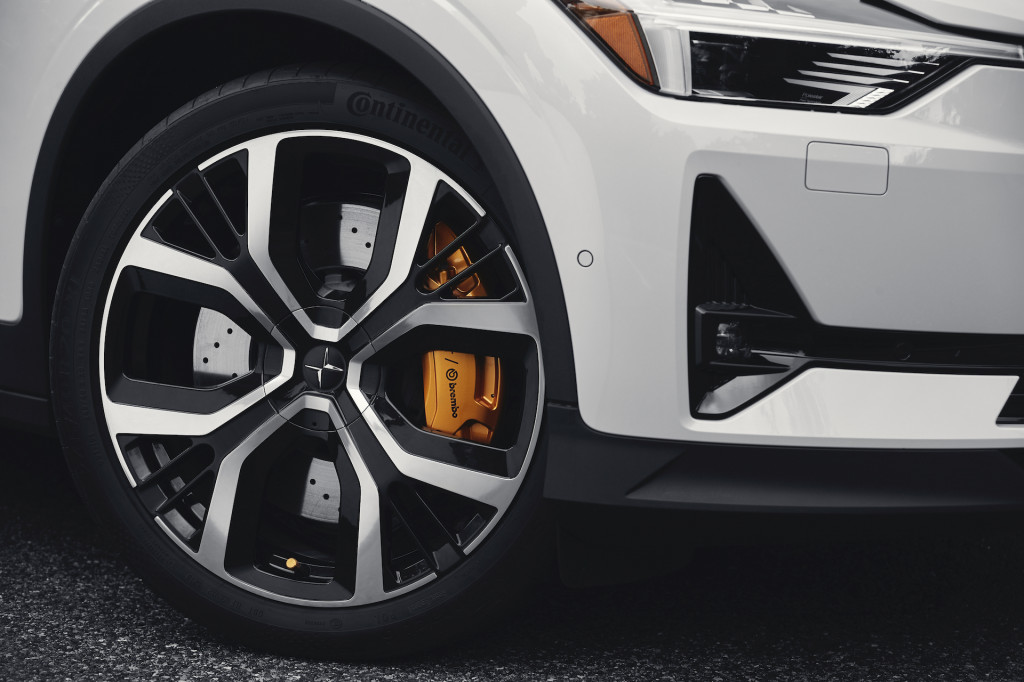Polestar, Volvo’s offshoot performance-oriented EV brand, is about three years old and it’s yet to deliver a production electric vehicle. That’s about to change with the brand’s second car, the appropriately named 2021 Polestar 2 electric fastback sedan.
Polestar’s first car was the Polestar 1, a carbon-fiber-bodied, $155,000 hybrid coupe that is limited to 1,500 units over its three-year run. This time around, Polestar goes further into the EV realm with a fully electric powertrain.
While the 2021 Polestar 2 is a full EV, it still has a foot in the internal combustion world because it’s built on Volvo’s CMA platform that also underpins the XC40 compact SUV—and the upcoming XC40 Recharge electric SUV. Unlike Tesla, which had to build and design its vehicles from scratch (save for the original Roadster), Polestar has the luxury of splitting off from Volvo and sharing some of the parent company’s engineering. That’s both good and bad.
I attended the coronavirus-postponed 2021 Polestar 2 launch event in Ypsilanti, Mich., to see if the Polestar’s first EV has what it takes to compete against a growing group of battery electric vehicles led by the Tesla Model 3.
Dynamics and power
The Polestar’s strengths lie in its power and agility, and my test car is the most agile version. That’s because it has the optional $5,000 Performance package—previously called Performance Pack—that adds manually adjustable Ohlins dual-flow valve dampers, gold Brembo calipers with cross-drilled brake discs, firmer spring rates and stabilizer bars, gold seat belts, a black roof panel, and 20-inch forged alloy wheels that mount summer performance Continental SportContact 6 tires.
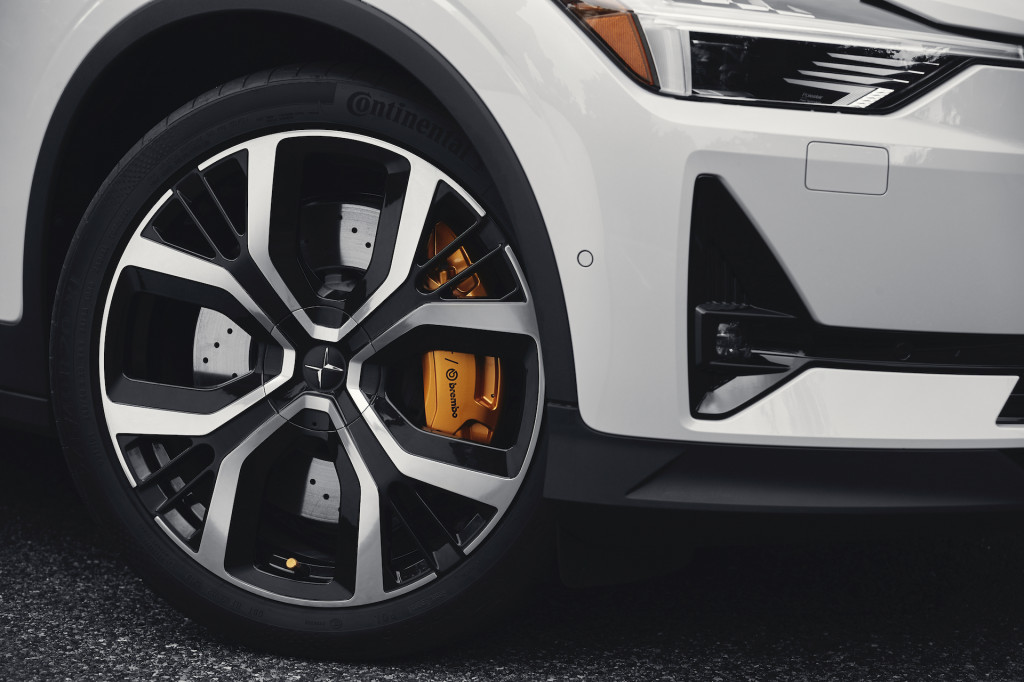
2021 Polestar 2
The Performance package may be optional, but the power comes standard. The Polestar 2 is driven by two identical permanent magnet motors, one up front and one in the rear, that combine to make 408 horsepower and 487 pound-feet of torque and draw their power from a 75-kwh battery pack.
As I pull onto the suburban streets of Ypsi headed toward the more-interesting roads of Hell, Michigan, the Polestar 2’s power and performance seem familiar. Both are tuned much like the Tesla Model Y Long Range I drove a few weeks ago. Power is instantaneous and smooth, and the deeper I hit the throttle the more it delivers, with willing thrust from both a stop and at highway speeds. Polestar quotes a 0-60 mph time of 4.45 seconds, and my internal VBOX tells me that’s accurate.
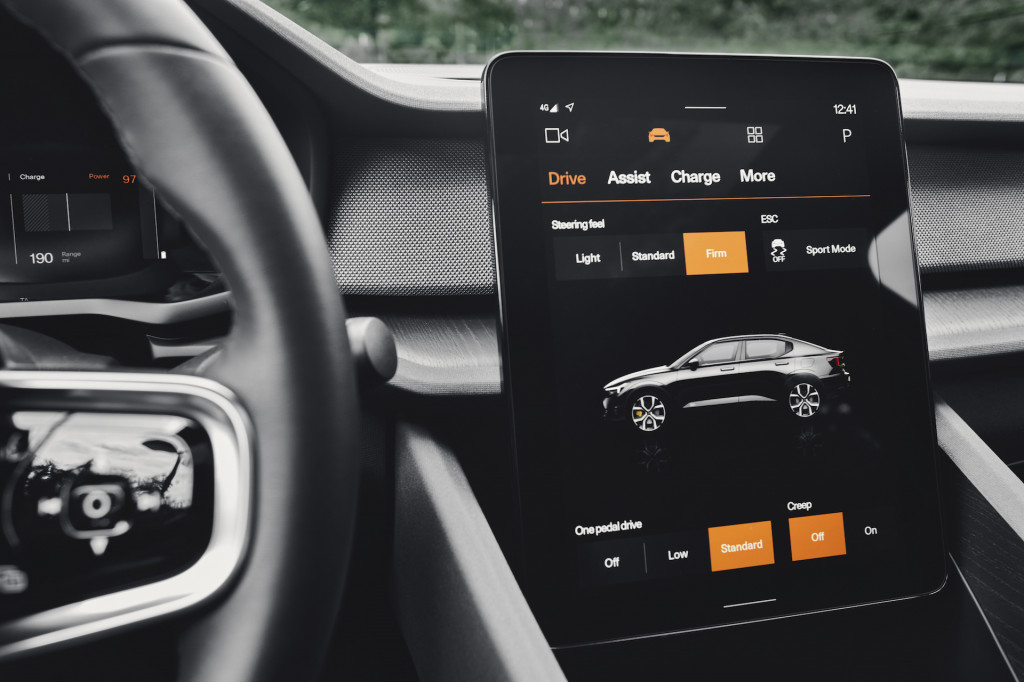
2021 Polestar 2
The Polestar 2 lacks all-encompassing drive modes. Instead, Polestar provides settings for one-pedal driving (Off, Low, and Standard), steering feel (Light, Standard, and Firm), stability control (ESC Sport or the factory setting), and Creep at stops (Off or On). The Ohlins dampers have to be adjusted on each damper individually. Owners can choose from 22 settings, with 1 being the firmest and 22 the softest. This car is tuned for the factory’s Nominal setting, which uses the 12 setting up front and slightly softer 14 in the rear.
Two additional factory recommendations are Track (8 up front 10 in the rear) and Comfort (18 front and 20 rear).
Adjusting these dampers can affect the way the car handles. For instance, firmer rear settings will allow more oversteer like you’d get by installing a stiffer rear stabilizer bar in a car. Polestar recommends the settings be changed by the dealer. This is some race-car tech in a street car, and we doubt many buyers will ever adjust the damper settings outside of perhaps a softer or firmer adjustment after a few miles with the Nominal setting.
One-pedal driving set to standard, stability control to Sport, steering to Firm, Creep to off, and phasers to stun, (one of those is a lie) the Polestar has a firm, sporty feel similar to the Model Y. With 5.7 inches of ground clearance (5.9 without the Performance package), it sits at the same height as a typical family sedan, but its 1,200 pounds of battery is set low and the suspension is firm, so it leans little in turns, is agile for its size, and attacks corners with neutral handling with a hint of understeer.
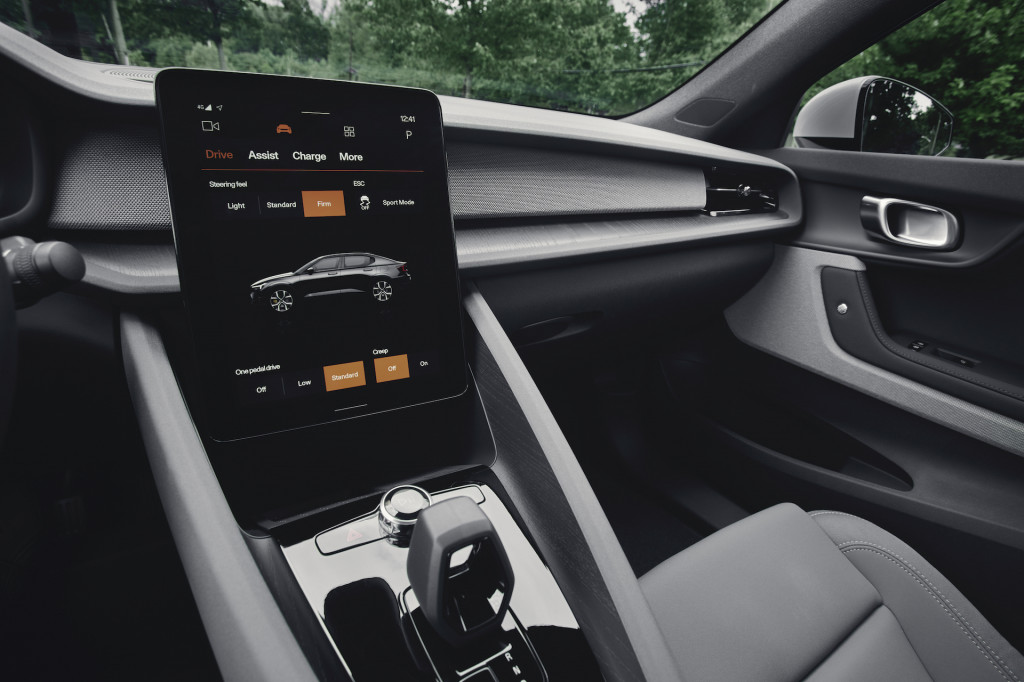
2021 Polestar 2
While I enjoy the agility, I grow weary of the heavy steering after a few miles. The steering modes are a Goldilocks proposition: Light is too light, Firm feels artificially heavy, and Standard is just the right balance of on-center stability and a natural feel. The 15.8:1 steering ratio doesn’t change between modes.
Like the Tesla, the Polestar’s Standard mode for one-pedal driving provides immediate drag any time I let off the throttle, and brings the car to a stop at suburban stop lights. A graph in the instrument cluster turns white any time the regenerative braking kicks in and adds an orange cross-hatched section when I get into the friction brakes. It’s interesting to watch because it shows how infrequently those Brembos have to get involved.
I also try the Off and Low settings. Engaging the Off one-pedal mode while I’m driving at steady speed suggests that there might be some regen in the mix even with my foot slightly on the accelerator. Low provides a little drag when I’m not accelerating, but I revert back to Standard because it will provide the best range and a more typical EV experience.
A different kind of luxury
The Polestar 2’s interior provides a different form of luxury than the typical mid-$60,000s luxury car. The similarities to a Tesla are also unmistakable. Like a Tesla, the cabin is dominated by a large center screen and is outfitted with sustainable materials. Unlike a Tesla, it also has a digital instrument cluster.
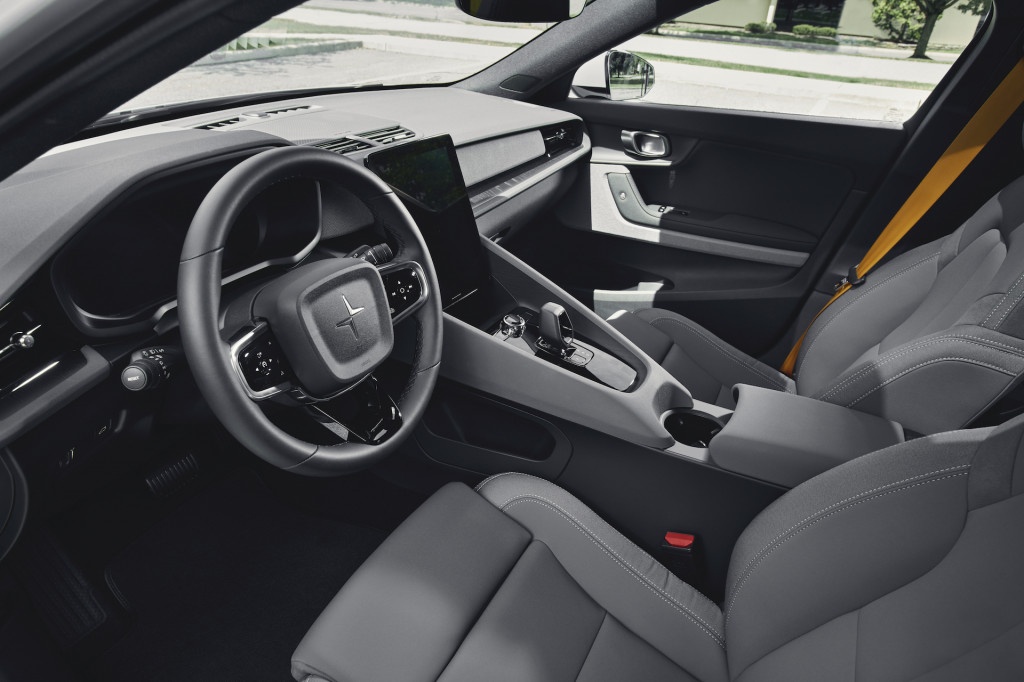
2021 Polestar 2
Polestar calls the seating material WeaveTech. Made up of largely recycled materials, it has the stretchable feel of a scuba suit. Polestar boasts that it’s largely free of the plasticizers found in most vinyl automotive fabrics to make them stretchable. The dash and door panels feature similar soft-touch, seemingly rubberized materials offset by dark recycled wood, small bits of chrome, and contrast stitching only on the seats.
The look is stark, cold, and Scandanavian, but not as warm and rich as we’ve come to expect in cabins from Audi, BMW, and Mercedes-Benz. Nonetheless, it could be thought of as the new cool because it’s sustainable and vegan. For those who want something more traditional, nappa leather upholstery is a rather expensive $4,000 option.
During my drive, a few packaging issues became apparent. The Polestar 2 has only one cupholder that’s easy to access. A second cupholder is located inside the center console and using it requires me to drive with the console lid tilted up. The car also lacks a USB-A port, opting for USB-C ports instead. It’s the way of the future, but it’s here too soon in the Polestar 2 and in other vehicles from Mercedes and Porsche.
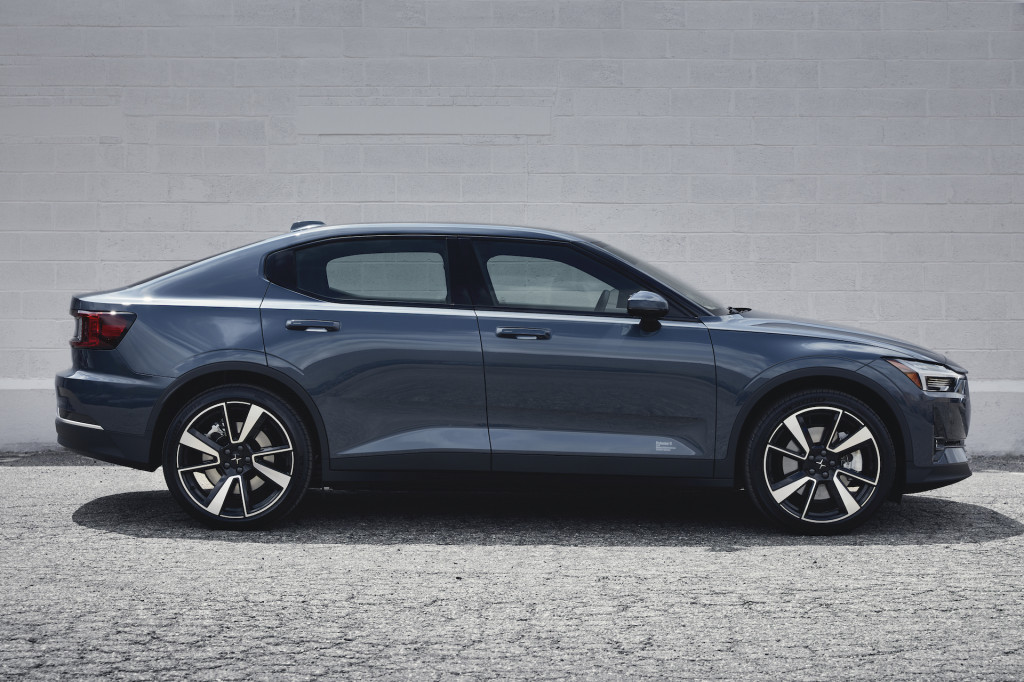
2021 Polestar 2
However, the biggest compromise is rear seat space, which is sacrificed as a concession to the vehicle’s internal-combustion engine-based CMA platform. The Polestar 2 doesn’t need it because its rear motor provides all-wheel drive, but the familiar central driveshaft hump is still there. Polestar uses it for the battery pack, which also sits under the front and rear seats, but it cuts into leg space for the center rear passenger.
The hard points of this platform also place the cabin farther back than the cab-forward Model 3 and the result is the loss of a few prized inches of rear leg room. The Polestar’s short seat bottoms also lack thigh support, and rear head room will be tight for anyone approaching 6-feet tall. Clearly, Tesla’s dedicated EV skateboard platform creates a much better rear seat package.
Part of the issue with head room is due to the 2’s standard panoramic sunroof, which introduces another issue. It’s tinted, but there is no sunshade to draw underneath it. With the hot sun beating down on the glass roof, I set the temperature to 66 degrees, and the air conditioning struggles to keep up. It seems anathema to make the climate control struggle in an efficiency-focused EV. Tesla does the same thing.
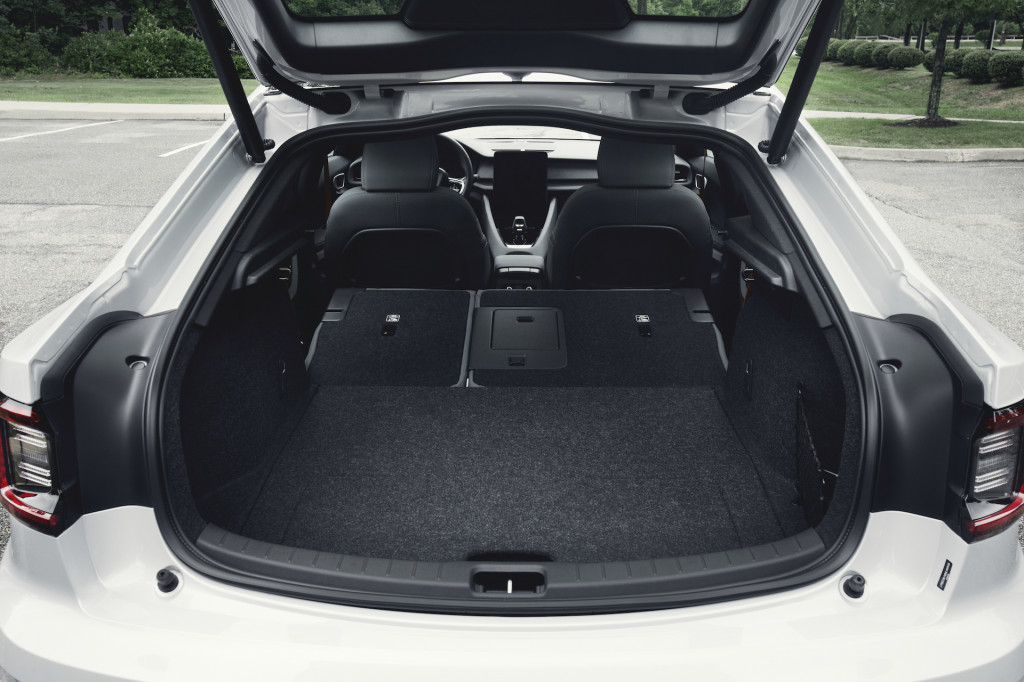
2021 Polestar 2
The cargo area isn’t compromised by anything other than the fastback shape. The Polestar 2 has 14.3 cubic feet of cargo space with the rear seats up—about the size of a typical sedan’s trunk—and 37.8 cubes with the second row folded flat. Another small bin can hold 1.2 cubic feet of cargo in the front trunk. Altogether, that’s a lot of useful space, much more than you’d get in a typical sedan, though the sharp rake of the roof won’t allow loading taller items.
Bringing Google into the car
The Polestar 2 marks the first use of a native Android Automotive operating system, which is not to be confused with Android Auto phone mirroring. The system is run through an 11.2-inch touchscreen and incorporates Google Maps, the Google Play store for app downloads, and a voice-activated, cloud-linked Google Assistant.
The system invites Google into your car, and owners can set up Google profiles or sign in with existing accounts. The Google Assistant can respond to the phrases “Hey Google” or “Okay Google” followed by commands to play music, navigate to a destination, find a charging station, perform local searches, check the weather, or read messages. The system requires a data connection for some of the cloud-based requests, like weather reports or local searches, but it can always control in-vehicle functions like adjusting interior temperature.
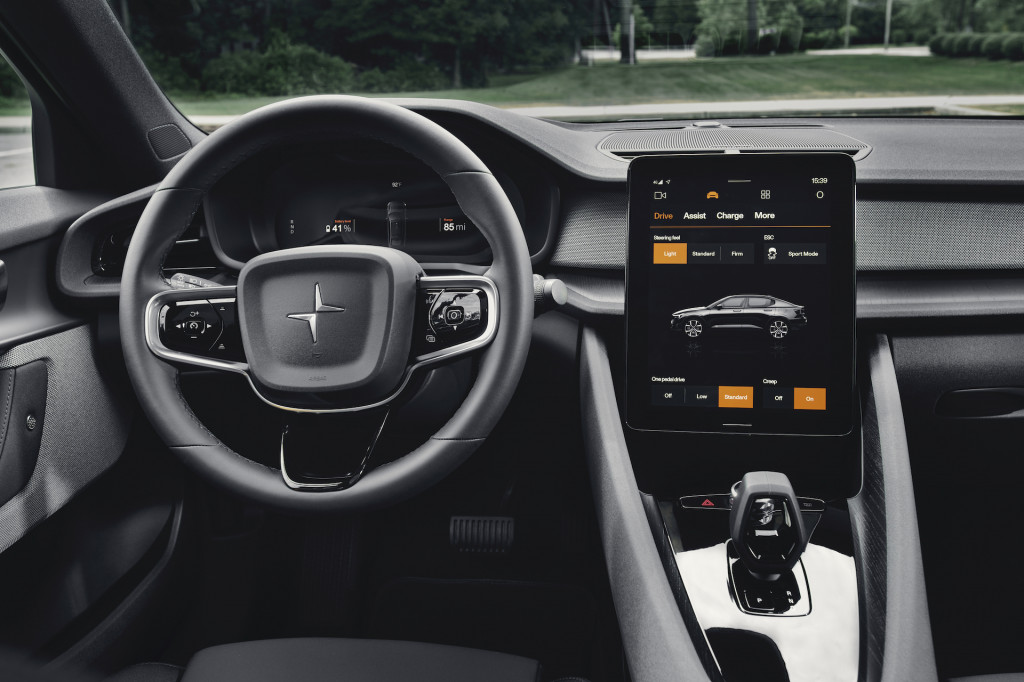
2021 Polestar 2
This is our first experience with the Android Automotive HMI, and so far we like it. The screen reacts quickly to touch controls and is laid out in a simple, phone-like manner. A line at the bottom acts as the home button and a row of icons up top control the vehicle settings, apps, camera view, and driver profile. When signed in, the Google Assistant tile can provide personalized information and recommendations as it learns your patterns.
I ran into some issues using the system because of what’s not there. It comes only with FM radio, so I wasn’t able to listen to AM or satellite radio. Both will be available through downloadable apps. I also can’t access information on my Apple iPhone 7 because Apple CarPlay isn’t available yet. It will be standard starting with an over-the-air update later this year. Finally, after initially pairing with my phone through Bluetooth, the system somehow doesn’t recognize it until I tell my phone to forget the Polestar as a device and pair it again.
The system has other pluses. I like the fact that the navigation map can also be displayed in the digital instrument cluster. It allows the driver to fiddle with different controls on the center screen or monitor driving efficiency while keeping the map up just below the line of view. The Android Automotive interface is in its infancy, and we will learn much more about it in the future.
Efficiency
My drive to Hell and back covers 81.8 miles that reduce the battery’s charge level from 98 percent to 55 percent. The range remaining on the instrument cluster falls from 200 to 100 miles, though it ticks off only in 10-mile increments, so that 100 miles could be more like 91. The trip computer says I used 37.8 kwh per 100 miles, and a graph on the efficiency screen shows that falls toward the top of the Normal range. That translates to 2.65 miles per kwh compared to 2.91 miles per kwh I got in the Model Y.
It’s not as efficient as the Tesla, but it’s not bad considering my drive included more than a few hard starts.
The Polestar 2 has a range of 291 miles on the European WLTP cycle. Polestar says it expects the 2 to get an EPA range rating in the mid-200-mile range when the results are published in early September. That’s 50-75 miles short of the Tesla Model 3, but it could be better than we’ve seen from other EVs from Audi, Jaguar, and Porsche.
Final thoughts
The Polestar 2 arrives as only as the full-zoot Launch Edition model with a sticker price of $61,200. Add this car’s $5,000 Performance package and $1,200 paint, and the total is $67,400, though the 2 is eligible for the $7,500 federal tax credit that Tesla no longer gets. Included in that price are the Pilot (driver-assistance features) and Plus (amenities) packages that won’t be mandatory on future versions of the 2. In fact, Polestar expects a version closer to $41,000 in the future.
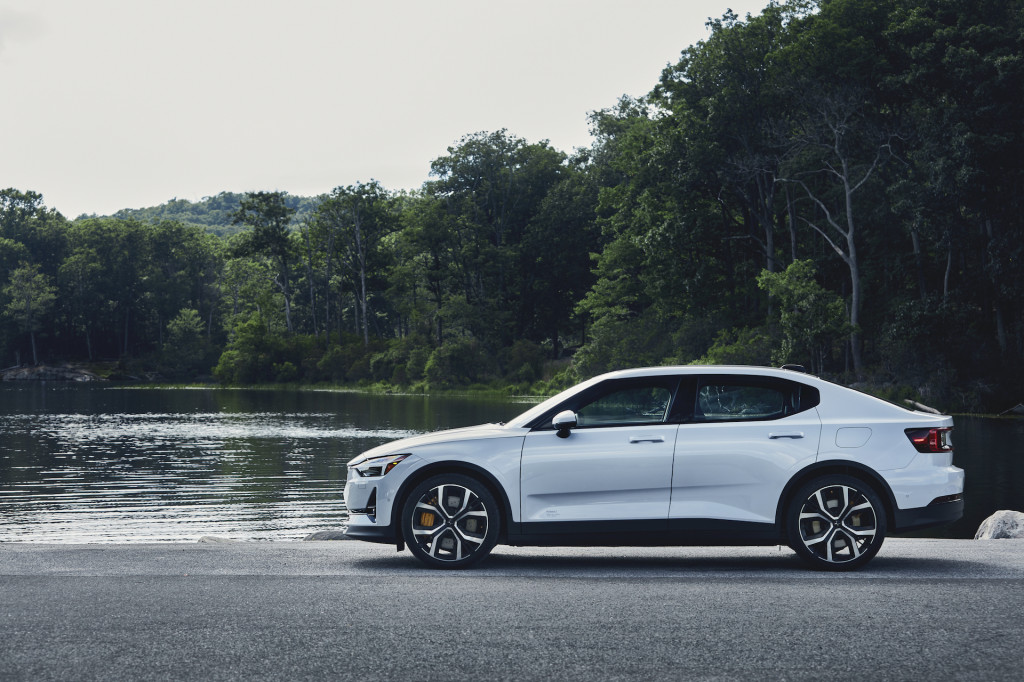
2021 Polestar 2
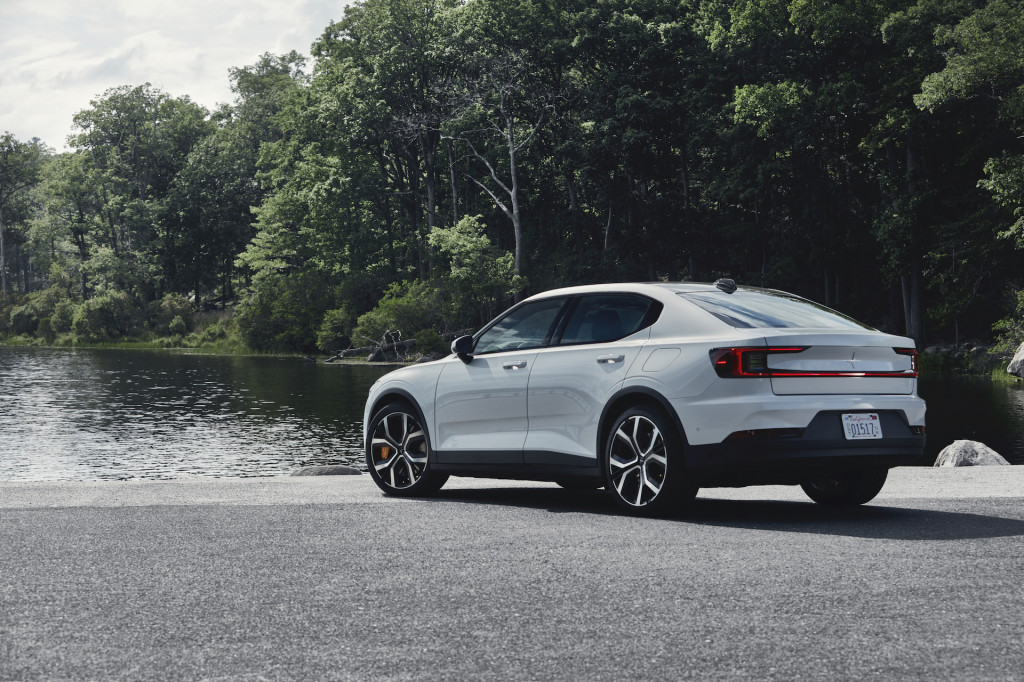
2021 Polestar 2
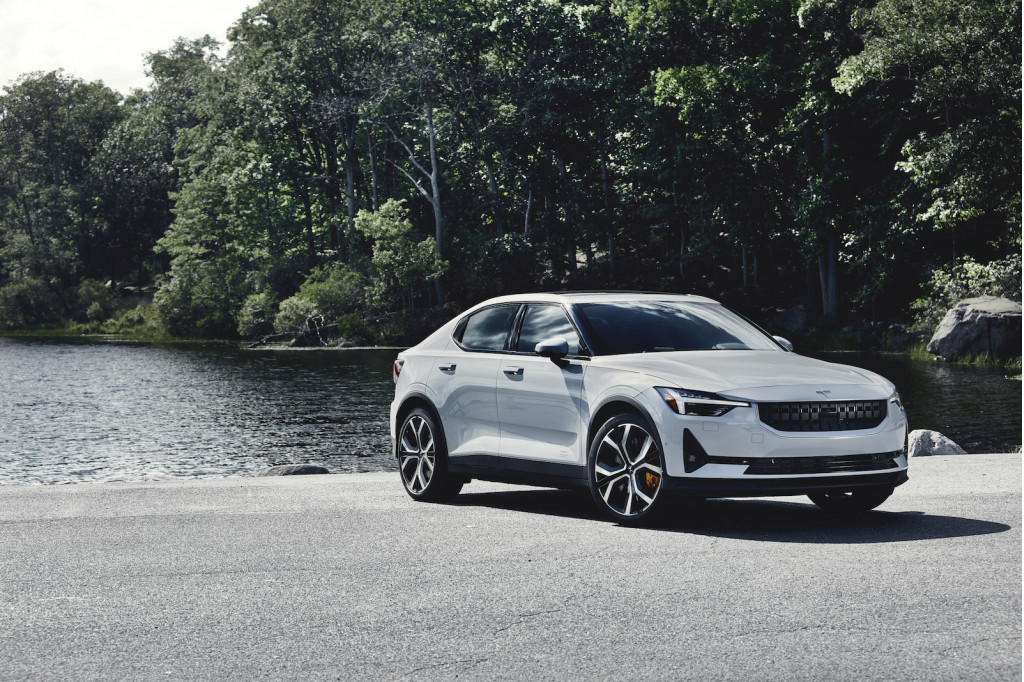
2021 Polestar 2
The Polestar 2 is built in China, but it started with a boost from Volvo, and that helps give the car the proven build quality that Tesla lacks. However, it saddles the car with a platform compromised by its ICE roots. That mostly translates to less room in the rear seat. Polestar is also potentially a decade behind Tesla in battery development, and while it’s not yet official, the 2 will certainly have less range than the Model 3.
It took three years, but the Polestar 2 is a competent and attractive first attempt at a full EV from a brand that promises only EVs moving forward. Moving further into the EV world with a dedicated EV platform and continued battery development will only make Polestar a more effective competitor for Tesla in the years to come.

